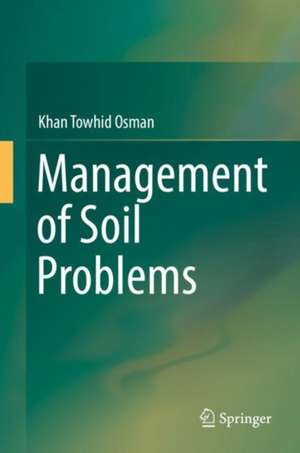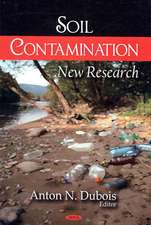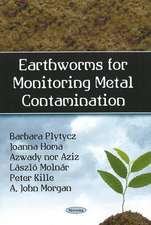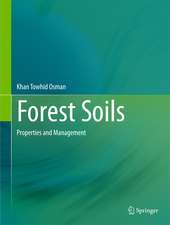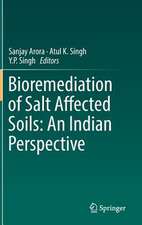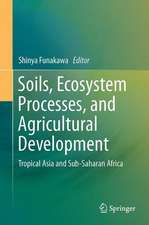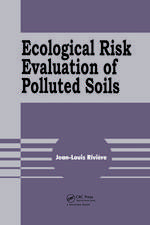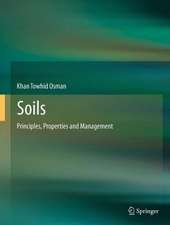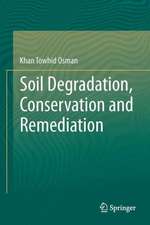Management of Soil Problems
Autor Khan Towhid Osmanen Limba Engleză Hardback – 14 mai 2018
Soils are neither good nor bad, but some have inherent or acquired characteristics that may or may not suit our intended use. Unsuitable characteristics are considered to be soil problems, soil constraints or soil limitations.
Only twelve percent of global land is right for agricultural production without much limitation. Some soils have severe limitations for crop production. These soils are so called ‘problem soils’. Many of them do not have enough fertility to be productive; some are arid and saline; some are very sandy and dry; and some are wet and waterlogged for most of the growing season.
The global demand for food, wood, fuel, fiber, medicine and other plant products for the 7.2 billion current world population has created such an immense pressure on global soil resources that even the most fertile soils are losing their productive capacity. We are being compelled to bring more and more unsuitable or marginally suitable soils under cultivation. Unless innovative and integrated soil, crop and environmental management practices are adopted for their improvement and sustainable use, further degradation is inevitable.
This book, Management of Soil Problems, identifies the problems and discusses management options in a smooth and reader-friendly style. It will be useful for students and professionals of soil science, agriculture, forestry, geography and environmental sciences.
Only twelve percent of global land is right for agricultural production without much limitation. Some soils have severe limitations for crop production. These soils are so called ‘problem soils’. Many of them do not have enough fertility to be productive; some are arid and saline; some are very sandy and dry; and some are wet and waterlogged for most of the growing season.
The global demand for food, wood, fuel, fiber, medicine and other plant products for the 7.2 billion current world population has created such an immense pressure on global soil resources that even the most fertile soils are losing their productive capacity. We are being compelled to bring more and more unsuitable or marginally suitable soils under cultivation. Unless innovative and integrated soil, crop and environmental management practices are adopted for their improvement and sustainable use, further degradation is inevitable.
This book, Management of Soil Problems, identifies the problems and discusses management options in a smooth and reader-friendly style. It will be useful for students and professionals of soil science, agriculture, forestry, geography and environmental sciences.
| Toate formatele și edițiile | Preț | Express |
|---|---|---|
| Paperback (1) | 899.52 lei 6-8 săpt. | |
| Springer International Publishing – 26 ian 2019 | 899.52 lei 6-8 săpt. | |
| Hardback (1) | 905.68 lei 6-8 săpt. | |
| Springer International Publishing – 14 mai 2018 | 905.68 lei 6-8 săpt. |
Preț: 905.68 lei
Preț vechi: 1104.48 lei
-18% Nou
Puncte Express: 1359
Preț estimativ în valută:
173.36€ • 188.37$ • 145.71£
173.36€ • 188.37$ • 145.71£
Carte tipărită la comandă
Livrare economică 22 aprilie-06 mai
Preluare comenzi: 021 569.72.76
Specificații
ISBN-13: 9783319755250
ISBN-10: 3319755250
Pagini: 469
Ilustrații: XX, 474 p. 126 illus.
Dimensiuni: 155 x 235 mm
Greutate: 0.87 kg
Ediția:1st ed. 2018
Editura: Springer International Publishing
Colecția Springer
Locul publicării:Cham, Switzerland
ISBN-10: 3319755250
Pagini: 469
Ilustrații: XX, 474 p. 126 illus.
Dimensiuni: 155 x 235 mm
Greutate: 0.87 kg
Ediția:1st ed. 2018
Editura: Springer International Publishing
Colecția Springer
Locul publicării:Cham, Switzerland
Cuprins
1 Management of Soil Problems: An Introduction.- 2 Dryland Soils.- 3 Sandy Soils.- 4 Shallow Soils.- 5 Soils with Drainage Limitations.- 6 Expansive Soils.- 7 Peat Soils.- 8 Soils on Steep Slopes.- 9 Poorly Fertile Soils.- 10 Saline and Sodic Soils.- 11 Acid Soils and Acid Sulfate Soils.- 12 Polluted Soils.- 13 Degraded Soils.
Textul de pe ultima copertă
Soils are neither good nor bad, but some have inherent or acquired characteristics that may or may not suit our intended use. Unsuitable characteristics are considered to be soil problems, soil constraints or soil limitations.
Only twelve percent of global land is right for agricultural production without much limitation. Some soils have severe limitations for crop production. These soils are so called ‘problem soils’. Many of them do not have enough fertility to be productive; some are arid and saline; some are very sandy and dry; and some are wet and waterlogged for most of the growing season.
The global demand for food, wood, fuel, fiber, medicine and other plant products for the 7.2 billion current world population has created such an immense pressure on global soil resources that even the most fertile soils are losing their productive capacity. We are being compelled to bring more and more unsuitable or marginally suitable soils under cultivation. Unlessinnovative and integrated soil, crop and environmental management practices are adopted for their improvement and sustainable use, further degradation is inevitable.
This book, Management of Soil Problems, identifies the problems and discusses management options in a smooth and reader-friendly style. It will be useful for students and professionals of soil science, agriculture, forestry, geography and environmental sciences.
Only twelve percent of global land is right for agricultural production without much limitation. Some soils have severe limitations for crop production. These soils are so called ‘problem soils’. Many of them do not have enough fertility to be productive; some are arid and saline; some are very sandy and dry; and some are wet and waterlogged for most of the growing season.
The global demand for food, wood, fuel, fiber, medicine and other plant products for the 7.2 billion current world population has created such an immense pressure on global soil resources that even the most fertile soils are losing their productive capacity. We are being compelled to bring more and more unsuitable or marginally suitable soils under cultivation. Unlessinnovative and integrated soil, crop and environmental management practices are adopted for their improvement and sustainable use, further degradation is inevitable.
This book, Management of Soil Problems, identifies the problems and discusses management options in a smooth and reader-friendly style. It will be useful for students and professionals of soil science, agriculture, forestry, geography and environmental sciences.
Caracteristici
Highlights all major soil limitations in agricultural and other uses, including many illustrations and tables Presents alternative, complementary and integrated management options for most soil problems in one volume Provides up to date literature on characteristics, distribution, and management of almost all soil problems
